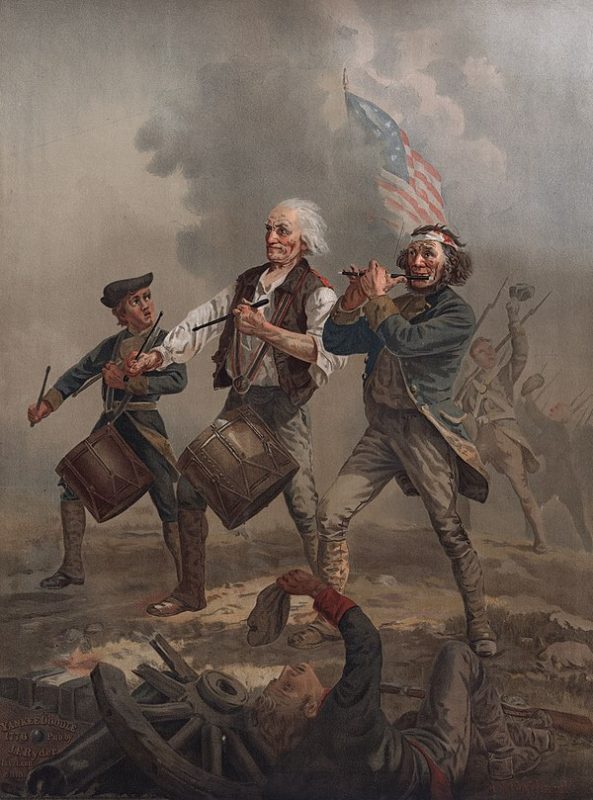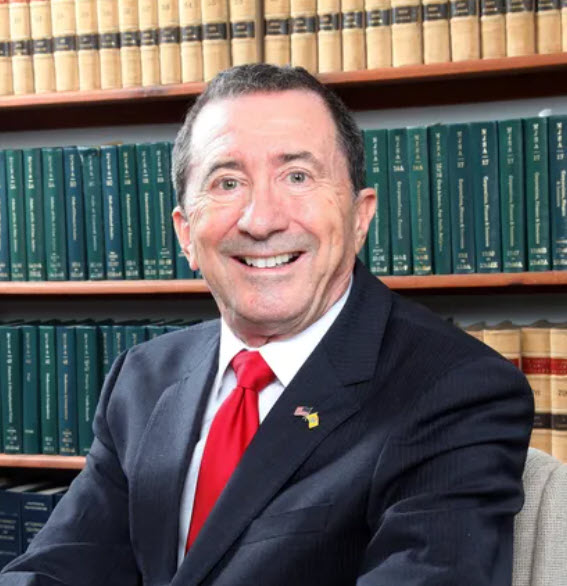
This iconic painting, “Spirit of ’76”, really portrays what happened on April 19, 1775. On that day some 2,000 American “Minutemen” from throughout Massachusetts came to Concord, Massachusetts to fight back against 700 British soldiers who massacred eight Americans at Lexington earlier that day. After they drove the British back to Boston, they proudly the song a British army officer had previously written to mock Americans.
Yankee Doodle went to town
A-riding on a pony,
Stuck a feather in his cap
And called it macaroni.
Click here for video of words and music of “Yankee Doodle”.
Click here for another video of the song “Yankee Doodle”.
When America was great, almost every American knew this song. Like my parents and grandparents, I as a “Boomer” sang it countless times in elementary school on Washington’s Birthday and heard it during July Fourth celebrations.
Most American children today either never heard of “Yankee Doodle”, or know it only as a children’s nonsense song.
To make America great again, we must again teach our children to understand and be proud of America. A good first step is to teach them this song. Before or after Thanksgiving dinner would be a perfect time.
“Yankee Doodle” was written by a British army officer twenty years before our War for Independence. He sang it to an old Dutch folk song to ridicule the American soldiers who were serving with him. At that time, thousands of Americans volunteered to help the British drive the French army out of Canada and the rest of North America.
Back then, sophisticated British “gentlemen” used the word “Yankee” as a slur or insult to describe Americans. It was based on many American immigrants who had trouble properly pronouncing the English letter “j”. Instead of correctly saying “Johnnie”, they would say something like “Yahnkie” instead.
Doodle, a variation of “dodo” meant stupid as it does today. Snobby British aristocrats in the 1700’s had many reasons to describe Americans as “Yankee Doodles”–stupid half-breeds who were not really British.
For years, the British colonies of North America had been the dumping ground for the losers of Europe. The Pilgrims fled to Massachusetts and the Quakers Pennsylvania when they lost their battles against Church of England. English Catholics fled to Baltimore to escape persecution by Protestants. French Protestants, including Paul Revere’s father, fled to every colony in America. So did the losers of the English Civil War, and various failed rebellions in Scotland and Ireland.
The British colonies of North America were the opposite of Spanish colonies in Mexico and South America. Those colonies had abundant gold and silver. Only “winners” with good social and political connections in Spain were permitted to build colonies in Spanish America.
Although those who came to British North America were seen losers in the Mother Country, Americans had great pride in themselves and the new life they built here.
Catholics, Protestants, French, English, Germans, French, Irish and Scots who hated and fought with each other in Europe lived and worked peacefully in America. They also often married each other.
British historian Paul Johnson also pointed out that Americans hardly paid any taxes. Each county had only four paid government officials. There was a clerk to record deeds, a surrogate to take care of wills, widows, and orphans, a judge to resolve disputes and a sheriff with volunteer help to enforce the law.
Because Americans got to keep almost all the money they earned, it was normal for young men to start work as broke, unpaid apprentices or indentured servants at age 15, and be comfortable owners of farms, ships, or businesses, by age 30.
This was when German immigrants described America as “Das Land Des Unbegrenzten Moeglichkeiten” (The Land of Boundless Opportunities) to their families back home.
Yankee Doodle mocked those Americans with these words:
Yankee Doodle went to town
A-riding on a pony,
Stuck a feather in his cap
And called it macaroni.
A “Yankee Doodle” was too crude and stupid to dress and act for upper class English society. If he didn’t have a horse, he would ride a pony into town.
Back in the 1700’s, Italians led fashion trends throughout Europe, and “macaroni” was a popular slang term for Italian. British “gentlemen” wore the latest fashions from Italy. An American wouldn’t bother. He would dress as he pleased with American homespun clothes. If he wanted an Italian look, he “stuck a feather in his cap and called in macaroni”.
George Washington, America’s first President, and commander of the American army in our eight year war against the British was a classic “Yankee Doodle”. He was a brave, talented, and effective leader of men who fought with distinction during the French and Indian War. However, when he applied for a command in the British Army, he was rejected because he was a “mere colonial” who had no political or social status in English society.
On April 19, 1775, “Yankee Doodle” became an important part of American history. A force of 700 British army regulars went out on a “surprise” mission to destroy weapons and ammunition stored by rebellious Americans in nearby Concord. On the way, three dozen armed American “Minutemen” lined up along the side of the road to show the British that their raid was no surprise. They British ordered them to disperse, and they quickly complied. However, the British viciously attacked anyway and killed eight Americans.
As the British continued their march towards Concord, their fifes played Yankee Doodle to mock the Americans they had massacred.
When the British finally got to Concord, the weapons and ammunition they were looking for were long gone. Instead they were met by roughly 2,000 armed and angry Americans. The Americans attacked and forced the British to retreat back to Boston with heavy casualties. The Americans then celebrated their victory by singing “Yankee Doodle”.
On July 4 of the following year, Americans declared their independence and fought the most powerful empire in the world for another eight years. Both sides played and sang “Yankee Doodle” for their own different reasons.
In 1781, the Americans won the Battle of Yorktown and caused a 7,000 man British army to surrender. As the British marched out to lay down their arms, an American band played the song “Yankee Doodle”.
That song was never used to mock Americans again. Instead, it was sung by Americans with pride.
When you gather with family, teach “Yankee Doodle” to the children in your family. Then ask why that song, and the story behind it, are no longer taught in our public schools.
Seth Grossman is a New Jersey attorney and executive director of LibertyandProsperity.com
- We are a group of roughly 150 ordinary citizens who mostly live near Atlantic City, New Jersey. We volunteer our time and money to maintain this website. We do our best to post accurate information. However, we have made mistakes. If you see any mistakes or inaccurate, misleading, outdated, or incomplete information in this or any of our posts, please let us know. We will do our best to correct the problem as soon as possible.
- If you agree with this post, please share it as much as you can. Please simply click the Twitter or Facebook icons below. Or better yet, please copy the link, or all or part of the content for this post, and paste it in the “comments” section of your local newspaper, your local “micro-newspaper” like Patch.com, or in any of the unwanted articles from CNN or other “mainstream” spammed into your Facebook feed before an election.
- Please also follow us on Parler.com at @libertyandprosperity1776 and on Gab at @libertyandprosperity. Thanks.
Seth Grossman, Executive Director
LibertyAndProsperity.com
(609) 927-7333

